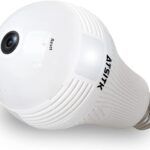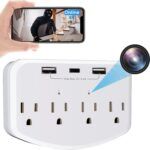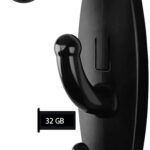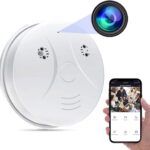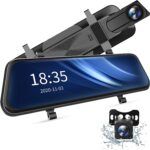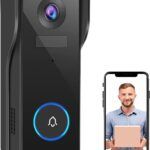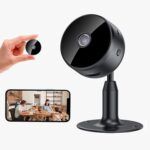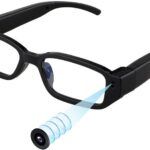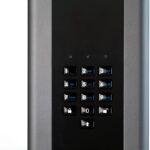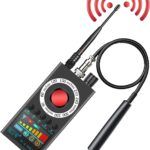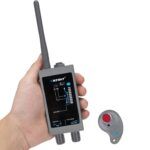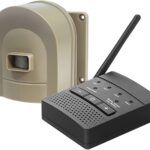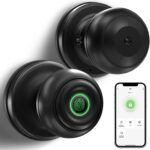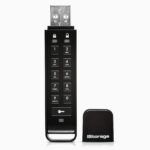Surveillance cameras with audio recording capabilities are not typically available as recording conversations without consent may be illegal in some states. Therefore, retailers often avoid selling such equipment.
However, in states where recording audio is permissible, we recommend considering some of the hidden spy cameras and other audio recording devices that we selected for you.
Showing 1–30 of 47 products

Akaluli Hidden Pen Voice Recorder
$43.99-
Sale!

Anlork Small Portable WiFi Nanny Cam
$29.99 
Atsitk Light Bulb Hidden Camera
$29.99
Binrrio Wristwatch Hidden Camera
$69.98
Clodgdlo Car Key Hidden Spy Camera & Microphone
$39.99
Cooau WiFi Mini Dash Cam Recorder
$89.99
Drift Ghost 4K+ Motorcycle Action Camera
$199.99
Dsoon WiFi Trail Camera
$139.99
Forthaus FM Radio Hidden Spy Camera
$109.99
Fun&H Dice Mini Spy Camera
$6.53
Funscam Water Bottle Wifi Spy Cam
$59.99
Fuvision Pen Spy Camera
$36.99
Garmin Mini Dash Cam
$129.99
Hereta Spy Camera Glasses
$74.99-
Sale!

Iznvee WiFi Repeater Hidden Camera
$59.99 
Jowows WiFi Hidden Camera Clock
$79.99
Lidcam+ Hunting Ballcap Action Camera
$199.99
Mituut Bracelet Watch Spy Camera
$39.98
Mituut Wearable Button Hidden Camera
$59.99
Miuyogern Alarm Clock Hidden Spy Camera
$39.99
Miuyogern WiFi Phone Charger Hidden Camera
$89.99
Mom Faves Car Key Hidden Camera
$50.99
Moorebot Scout Surveillance Robot
$200.00
Moultrie Cellular Trail Camera
$99.99
Nazarr Power Bank Hidden Spy Camera
$56.98
OhO 4K Sunglasses Spy Camera
$168.99
OhO Ski Goggles Camera
$249.99
OhO Smart Camera Glasses
$119.99
Oucam Small WiFi Spy Camera
$17.99
PBN-TEC K-MIC Voice Activated Recorder
$119.99

Surveillance cameras with audio recording capabilities are a hotly debated topic in the world of security and privacy. While they can provide valuable evidence in criminal investigations and improve security, they can also be used to infringe on people’s privacy and violate their rights. The legality of audio recording with surveillance cameras varies from state to state, and this has led to a lack of availability of cameras with audio recording capabilities.
Is it legal to record audio?
In many states, recording audio without the consent of all parties involved is illegal. This is known as a “two-party consent” law. These laws require that both parties must be aware that they are being recorded, and they must give their consent for the recording to be legal. However, in some states, only one party needs to be aware that the recording is taking place. These states have “one-party consent” laws. It is important to note that the laws regarding audio recording vary widely from state to state, and it is essential to check the laws in your state before installing any surveillance equipment.
Because of the legal restrictions on voice recording, many surveillance cameras do not come with audio recording capabilities. Stores are hesitant to sell surveillance cameras with audio recording features because of the legal issues involved. This has led to a lack of availability of cameras with audio recording capabilities, even in states where it is legal to record audio.
Lack of audio recording is especially prevalent with spy cameras. Using these hidden or camouflaged devices typically means at least one party in a conversation is unaware that they’re being recorded.
Privacy concerns
In addition to legal issues, there are also privacy concerns associated with audio recording. While video surveillance is generally accepted as a security measure, audio recording can be seen as intrusive and a violation of privacy. This is particularly true in situations where people may be discussing sensitive or personal information. This has led many people to object to the use of surveillance cameras with audio recording capabilities in public places.
So why would you record audio?
Despite these concerns, there are situations where audio recording can be a valuable addition to a surveillance system. In many cases, an audio recording can provide valuable evidence in criminal investigations. For example, audio recording can capture the sound of a breaking window, a gunshot, or an intruder’s footsteps. This can provide critical evidence that can help law enforcement to identify and apprehend suspects.
In addition to criminal investigations, audio recording can also be a valuable tool for security and surveillance. For example, audio recording can be used to monitor public areas and identify potential threats. In situations where security personnel may not be present, audio recording can provide an extra level of surveillance and protection.
Balancing security and privacy
One of the challenges of using surveillance cameras with voice recording capabilities is to balance the need for security with the right to privacy. This is particularly true in public places, where people have a reasonable expectation of privacy. In many cases, the use of surveillance cameras with audio recording capabilities in public places is controversial, and it has led to heated debates about privacy and security.
To address these concerns, many states have developed guidelines for the use of surveillance cameras with audio recording capabilities. These guidelines typically outline the legal requirements for audio recording, including consent requirements and limitations on the use of recorded audio. They also provide guidance on how to balance the need for security with the right to privacy.
Should you buy a camera with audio recording features?
Surveillance cameras with audio recording capabilities are a valuable tool for security and surveillance. However, the legal restrictions on recording conversations and the privacy concerns associated with it have led to a lack of availability of cameras with audio recording capabilities.
While there are situations where audio recording can provide valuable evidence and enhance security, it is essential to balance these benefits with the right to privacy. As the legal landscape continues to evolve, it is likely that the use of surveillance cameras with sound recording capabilities will continue to be a contentious issue in the world of security and privacy.
Most important: ensure you can legally record audio!
When purchasing a surveillance camera, it is crucial to be aware of the laws in your state regarding the recording of audio. While some states allow the recording of audio without the consent of all parties, other states require all parties to consent to being recorded. It is essential to understand the legal requirements before making a purchase and ensure that the camera you choose is compliant with the applicable laws.
Violating state laws regarding the recording of audio can lead to serious legal consequences, including hefty fines and even imprisonment. In addition to legal implications, recording audio without consent is an invasion of privacy and can cause significant harm to personal and professional relationships. Recording audio conversations often falls under state “Wiretapping” laws which can be serious felonies involving prison sentences.
Buyers should take the time to research the applicable laws in their state and consult with a legal expert if necessary to ensure that they are not violating any laws when using surveillance cameras with sound recording capabilities.
In summary, buyers of surveillance cameras need to be aware of the laws regarding the recording of audio in their state before making a purchase. Recording audio without consent is a serious legal and ethical issue that can lead to severe consequences. By understanding the legal requirements and ensuring that the camera they choose is compliant with the laws, buyers can avoid legal and ethical issues and ensure the safety and security of their property.


